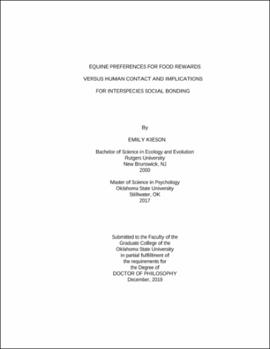| dc.contributor.advisor | Abramson, Charles I. | |
| dc.contributor.author | Kieson, Emily | |
| dc.date.accessioned | 2020-06-26T21:28:01Z | |
| dc.date.available | 2020-06-26T21:28:01Z | |
| dc.date.issued | 2019-12 | |
| dc.identifier.uri | https://hdl.handle.net/11244/324889 | |
| dc.description.abstract | The primary focus of the dissertation is to study horse preference for human contact versus food rewards. The study uses horses' ability to differentiate between visual symbols with different meanings in order to test the horses' preference for human contact versus food reward. Humans use food rewards as positive reinforcement for training horses, but there is little evidence to show that human contact (scratching or patting) has reward value for horses or if domestic horses perceive human touch as social bonding. Most horse training is based on negative reinforcement, but food is a known positive reinforcer. This study looks at how horses may perceive human interaction as a form of positive reward by examining whether scratching and patting can serve as a reward for a behavior and how this compares to known rewards (treats) based on horses' ability to use symbols to show preferences. The second purpose of this study is to explore horse-human social bonding opportunities based on the unique backgrounds of each horse subject and variations in behaviors towards known and unknown humans. The study counted the number of times each horse touched each target (touch counts) and recorded any behaviors. The touch counts for each symbol for the last trial were compared using Observation Oriented Modelling (OOM), a non-parametric approach to analyze patterns in data. Based on the observed pattern analysis of touch counts, all horses in this studied showed preference for treats over human contact, regardless of handling or training histories. Analysis of behavioral changes during each testing session shows that each horse demonstrated states of arousal which supports existing literature that novel food increases arousal in horses. Emerging research in equine ethology suggests that horses only touch conspecifics with whom they have already bonded and this touch is always mutual and takes place after periods of arousal. The human need for touch and food exchange for purposes of social bonding may not align with the social needs of horses. | |
| dc.format | application/pdf | |
| dc.language | en_US | |
| dc.rights | Copyright is held by the author who has granted the Oklahoma State University Library the non-exclusive right to share this material in its institutional repository. Contact Digital Library Services at lib-dls@okstate.edu or 405-744-9161 for the permission policy on the use, reproduction or distribution of this material. | |
| dc.title | Equine preferences for food rewards versus human contact and implications for interspecies social bonding | |
| dc.contributor.committeeMember | Grice, James | |
| dc.contributor.committeeMember | Byrd-Craven, Jennifer | |
| dc.contributor.committeeMember | Self, Mary Jo | |
| osu.filename | Kieson_okstate_0664D_16482.pdf | |
| osu.accesstype | Open Access | |
| dc.type.genre | Dissertation | |
| dc.type.material | Text | |
| dc.subject.keywords | behavior | |
| dc.subject.keywords | equine | |
| dc.subject.keywords | horse-human interaction | |
| dc.subject.keywords | interspecies | |
| dc.subject.keywords | preferences | |
| dc.subject.keywords | reinforcement | |
| thesis.degree.discipline | Psychology | |
| thesis.degree.grantor | Oklahoma State University | |
